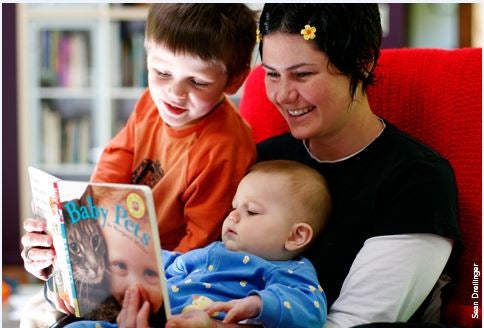International literacy day on September 8th offers a new opportunity to raise awareness of the importance of literacy to individuals and society. Being able to read and write can impact people’s lives on many levels. It can enable a person to read a sign on the street, enjoy reading a book, complete an education, land a job, earn an income to provide for his or her family and contribute to society and a country’s economic growth. And to think that it can all start with just a bedtime story, as opening a storybook can open up a whole world of possibilities for children and have a huge impact on their development.
Reading a bedtime story can be one of the most rewarding experiences for parents, a time when they establish a deep connection with their children. During that very intimate moment, the child’s whole world revolves around knowing what will happen next and the parent enjoys his or her undivided attention. As children quickly grow up to become teenagers, parents will cherish those memories for years to come.
For the child, this will mean much more than a childhood memory. By talking to children, playing with them, reading or telling them stories—or not—parents and other family members determine how much stimulation young children receive. After all, the family is the single most important determinant of the well-being of children, and these choices have profound and long-lasting effects on their development.
Young children need to have a home environment that stimulates the development of language and cognition, in addition to having warm, nurturing, and stable interactions with their family. How can parents foster this development at home in the preschool years? Shared reading is a good example: parents and children share an age-appropriate book with parents promoting an active role of children in book-reading by asking them questions and providing feedback. There is encouraging evidence in the US of the effect of this approach on the development of vocabulary of preschool and kindergarten children.
In the developing world, however, the fact that many parents of poor children have limited skills (for example, those that are illiterate or have very little schooling) may present an important constraint. Indeed, in Latin America parents’ literacy is an area in which the home environment can keep many children from reaching their full potential. Children of mothers with less education are much less likely to be read to than children of mothers with more education in all of the region’s countries except Guyana, where very few children are read to, regardless of their mothers’ education.
For children of school age, a number of programs have focused on increasing reading and literacy during summer holidays when children from low socioeconomic background tend to lose ground on literacy achievement compared to their more affluent peers—a phenomenon that has been described as “Summer Loss.” Researchers speculate that this setback is partly explained by lack of voluntary reading over the summer. There is encouraging evidence from US studies that suggests that distributing books to children over the summer and engaging parents and teachers in the process can produce gains in literacy.
Books are not the only way of affecting the interaction between caregivers and children. In fact, parenting programs designed to stimulate child cognition have been piloted in the region with promising results. Some of these issues are discussed in the 2015 edition of the IDB’s flagship series, Development in the Americas, entitled The Early Years: Child Well-being and the Role of Public Policy. Click here to receive updates on this upcoming book and a free PDF upon publication.


Leave a Reply